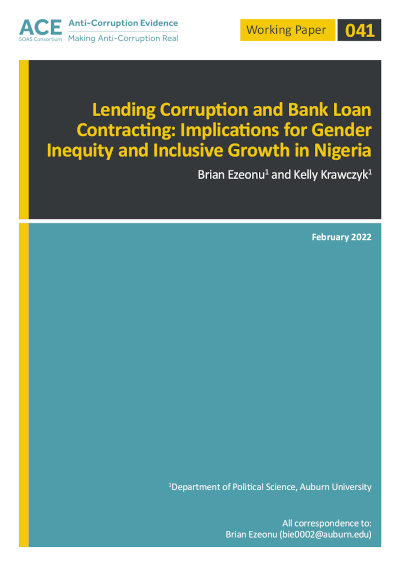
Publication Type: Working Paper
Countries: Nigeria
Authors: Brian Ezeonu, Kelly Krawczyk
Publication date: February 2022
Keywords: Finance
Lending corruption, which is the focus of this research, captures both paying bribes and using familiarity rather than merit as the metric to access credit. This research is especially important in the efforts to reduce the gender gap in Nigeria, as it has been well-established in literature that corruption has a disproportionate effect across gender. Women entrepreneurs make significant contributions to their economies. It is estimated that micro-, small- and medium-sized enterprises (MSMEs) with full or partial female ownership represent 31% to 38% of formal MSMEs in developing countries and yet, across regions, women entrepreneurs have lower access to finance than do male entrepreneurs. In countries like Nigeria and Ghana, several other barriers contribute to this lack of access to credit, including higher revolving credit utilisation rates and a greater prevalence of corrupt practices.
Using Nigeria as a case study, this empirical study examines how lending corruption affects loan contracts of women entrepreneurs and the implications for achieving inclusive growth in West Africa. This study utilised the UK government’s analytical framework for analysing the impact of private-sector corruption to assess corruption in bank lending in Nigeria, with a specific focus on how this corruption affects women entrepreneurs. The study uses the data collected and findings generated to make policy recommendations for innovative and feasible interventions that can help to combat lending corruption.
This study sampled three states with high levels of commercial activity in Nigeria: Abia, Lagos and Plateau. It has used mixed methodology. We conducted 40 surveys of both women and men in each of these three states who own MSMEs, to investigate their real experience with corruption by bank officials in the lending process. Questions in the surveys included: have you ever applied for a bank loan? Was the process you experienced the same as the official process available to the public? Did you have to pay any other fee other than the specified application fee? What was the loan application outcome? We also conducted face-to-face interviews with 20 bank executives and a further 20 identified key informants in each of the three states. Key findings include evidence of variation in the perception of corruption across different states, as a result of different banking policies, and that lending corruption discourages women-owners of MSMEs from seeking loans through banks, resulting in a lack of capital to expand their businesses over time. We recommend policies to promote online loan application approaches, and better use of credit systems. These policies will address the variations in banking policies across Nigerian states that contribute to market-restriction-driven corruption, using the Anti-Corruption Evidence (ACE) research consortium strategies of (i) aligning incentives and (ii) designing for differences. We also recommend the inclusion of both men and women in empowerment and sensitisation programmes.

